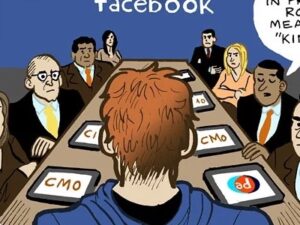Chew On That
Everyone knows the old Upton Sinclair line about food industry reporting: “I aimed at the public’s heart, and by accident I hit it in the stomach.”
The New York Times is finding the same – in a manner of speaking.
Its home cooking and recipe vertical is now one of the strongest parts of its business, The Hollywood Reporter reports.
News companies are doubling down on video recipes and food reviews in general because that kind of content crushes in algorithmic short-form video feeds. That’s nothing new. BuzzFeed’s Tasty business has been a workhorse revenue driver for the better part of a decade.
But a year ago, the Times and Instacart announced a strategic partnership to make NYT recipes shoppable and distribute videos across the Instacart app. Potential new revenue generators include in-video brand placements and ad-sponsored recipes that would otherwise be paywalled.
And the Times isn’t the only publisher with a deal cooking.
In March, food delivery and restaurant platform Wonder (owner of Grubhub and Blue Apron), acquired food and social-based production company Tastemade for $90 million.
You OK, Brazil?
A number of Brazilian-based creative agencies are facing backlash related to their award-winning 2025 Cannes Lions submissions, Campaign reports.
First, DM9, which falls under the DDB/Omnicom umbrella, withdrew three of its campaigns after it was discovered that the case study for its Creative Data Grand Prix-winning submission contained AI-manipulated content.
According to a press statement from Cannes Lions, the content was used “to simulate real world events and campaign outcomes resulting in the jury being presented with inaccurate information.”
Meanwhile, another DDB agency, Africa Creative São Paulo, had to apologize after boasting in its campaign – which won the Grand Prix in the audio and radio category – that it deliberately used short song clips to avoid paying any music licensing fees.
And then there’s LePub São Paulo (owned by Publicis), which won the Bronze Lion for a campaign that featured unverifiable data without client approval, including a geo-targeted presale of merchandise that might not have actually occurred.
Cannes Lions has yet to comment on the latter two, but in response to the DM9 controversy, the organization released new safeguards for the submission review process, such as mandatory AI disclosure, updated detection tools and a dedicated committee of “experts in AI, ethics and content.”
Personal Preference
Netflix might have removed some of your favorite movies from its Originals roster, but don’t worry – it’s making it up with personalized ads.
The streaming service is exploring a new way of personalizing content, including by curating trailers to an individual user’s preferences (which is pretty straightforward) or by personalizing interactive content (far more complicated).
These ideas are described in recent patents issued to Netflix, Business Insider reports.
Cool, but what exactly is interactive content? In February, Netflix received a patent for “choose-your-own-adventure-style titles” that would use machine learning to understand a viewer’s unique preferences.
The idea is to ramp up “social media virality,” Phil Petitpont, co-founder of AI startup Moments Lab, tells BI, “as users are likely to share their experiences with others.”
At least now you don’t have to worry about your friends spoiling the season finale of your favorite show – your finale might look totally different than theirs.
But Wait! There’s More
Integral Ad Science has been on the Nasdaq for four years now. Its fate is less certain than ever. [Digiday]
Microsoft’s Authenticator app isn’t going to manage your passwords anymore. [The Verge]
The role of chief marketing officer is “getting a glow-up.” [Adweek]
DeepSeek’s AI app might face a ban in Germany for “illegal transfers of user data to China.” [Search Engine Journal]
You’re Hired!
Bill Todd joins Infillion as general manager of its media business unit. [release]
Horizon Media appoints Krish Kuruppath as EVP and head of tech; Jeremy Flynn as EVP and head of product; and Allan Johnston as SVP and head of program management. [Adweek]












